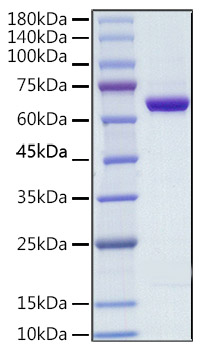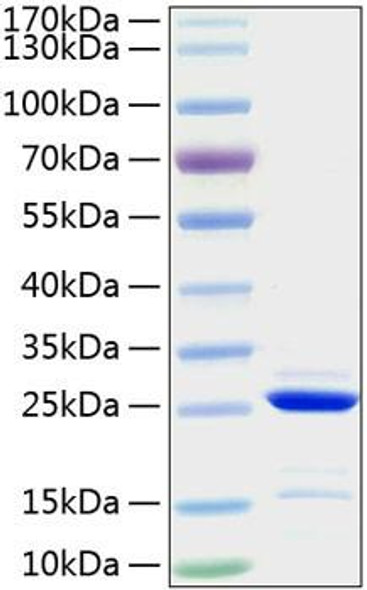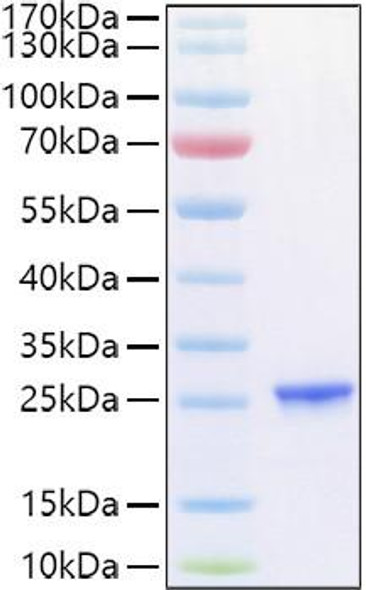Description
Recombinant Human COX-2 Protein
The Recombinant Human COX-2 Protein is a biologically active recombinant protein that plays a significant role in various cellular processes and signaling pathways in human biology. This protein is widely employed in immunological research, cell biology studies, protein-protein interaction analyses, and therapeutic development, providing researchers with a reliable tool for investigating COX-2 function and its implications in health and disease.
This product (SKU: RPCB1890) is produced using Baculovirus-Insect Cells and features a C-His tag for convenient detection and purification. The protein exhibits a calculated molecular weight of 68.5 kDa with an observed molecular weight of 66 kDa under denaturing conditions, achieving ≥ 90 % as determined by SDS-PAGE., ensuring exceptional quality and consistency for research applications.
Key Features
| High Purity by Affinity Chromatography | |
| Mammalian & Bacterial Expression Systems | |
| High lot-to-lot consistency via strict QC |
| Product Name: | Recombinant Human COX-2 Protein |
| SKU: | RPCB1890 |
| Size: | 50 μg |
| Reactivity: | Human |
| Synonyms: | COX-2, COX2, GRIPGHS, hCox-2, PGGHS, PGHS-2, PHS-2 |
| Tag: | C-His |
| Expression Host: | Baculovirus-Insect Cells |
| Calculated MW: | 68.5 kDa |
| Observed MW: | 66 kDa |
| Gene ID: | 5743 |
| Protein Description: | High quality, high purity and low endotoxin recombinant Recombinant Human COX-2 Protein (RPCB1890), tested reactivity in Baculovirus-Insect Cells and has been validated in SDS-PAGE.100% guaranteed. |
| Endotoxin: | < 1 EU/μg of the protein by LAL method. |
| Purity: | ≥ 90 % as determined by SDS-PAGE. |
| Formulation: | Lyophilized from sterile 50mM Tris, 100mM NaCl, 0.5mM PMSF, 10% glycerol, pH 8.0. |
| Reconstitution: | Centrifuge the vial before opening. It is recommended that sterile water (200uL) be added to the vial to prepare a stock solution of 0.25mg/mL. Avoid vortex or vigorously pipetting the protein. For long term storage, it is recommended to add a carrier protein or stablizer (e.g. 0.1% BSA, 5% HSA, 10% FBS or 5% Trehalose), and aliquot the reconstituted protein solution to minimize free-thaw cycles. |
| Storage: | Store at -20℃.Store the lyophilized protein at -20℃ to -80 ℃ up to 1 year from the date of receipt. After reconstitution, the protein solution is stable at -20℃ for 3 months, at 2-8℃ for up to 1 week. |
PTGS2, also known as COX-2, is s component of Prostaglandin-endoperoxide synthase (PTGS). PTGS, also known as cyclooxygenase, is the key enzyme in prostaglandin biosynthesis, and acts both as a dioxygenase and as a peroxidase. There are two isozymes of PTGS: a constitutive PTGS1 and an inducible PTGS2, which differ in their regulation of expression and tissue distribution. PTGS2 is overexpressed in many cancers. The overexpression of PTGS2 along with increased angiogenesis and GLUT-1 expression is significantly associated with gallbladder carcinomas. Furthermore the product of COX-2, PGH2 is converted by prostaglandin E2 synthase into PGE2, which in turn can stimulate cancer progression. Consequently inhibiting COX-2 may have benefit in the prevention and treatment of these types of cancer. PTGS2 is regulated by specific stimulatory events, suggesting that it is responsible for the prostanoid biosynthesis involved in inflammation and mitogenesis. It mediates the formation of prostaglandins from arachidonate and may have a role as a major mediator of inflammation and/or a role for prostanoid signaling in activity-dependent plasticity.







